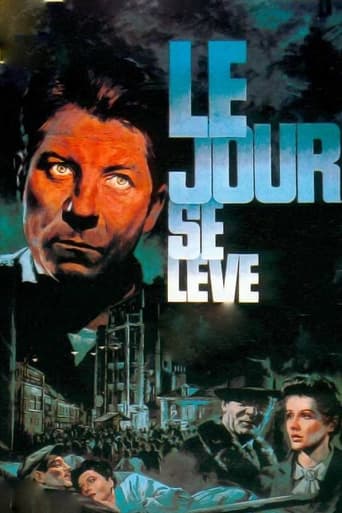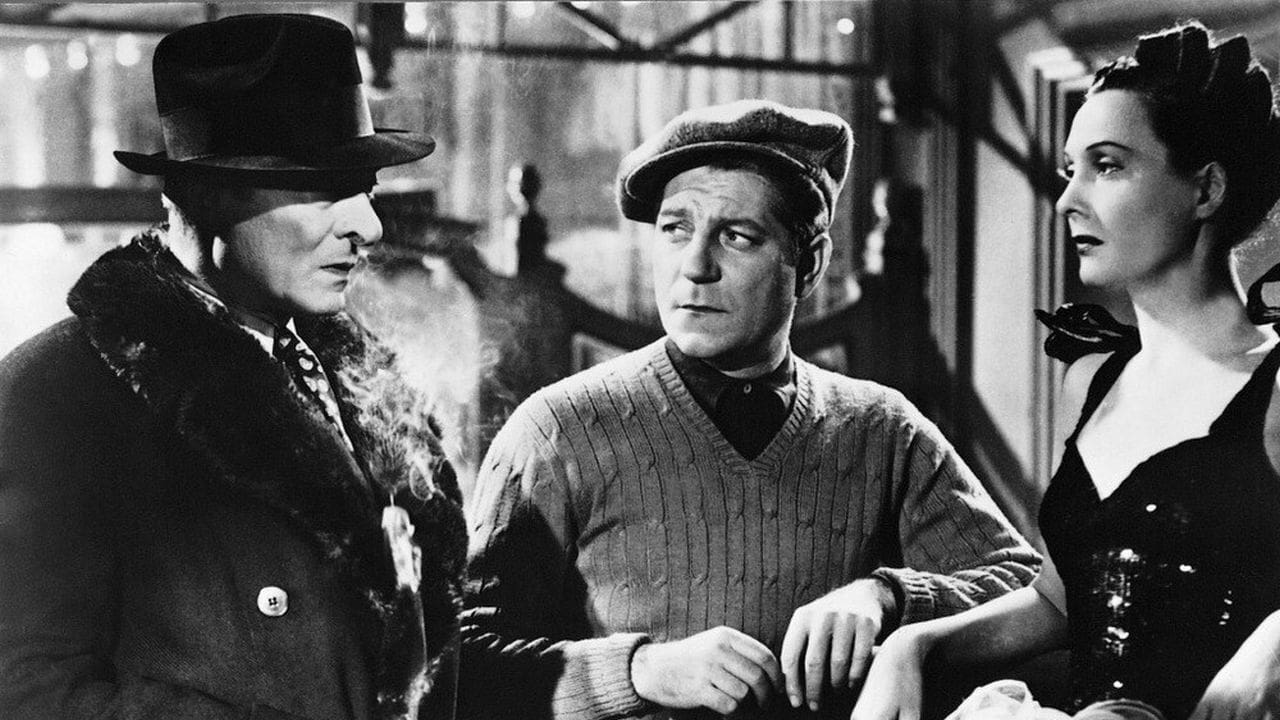ElMaruecan82
On the surface, Marcel Carné's "Daybreak" is a heart-pounding claustrophobic thriller based on a then-revolutionary use of non-linear flashback-driven narrative and that was two years before Orson Welles' "Citizen Kane", on the surface, one can see the film and find every reason to love it.Still, one viewing wouldn't do justice to the film. You might watch it once to get the overall picture, then a second time to really appreciate the existential poetry of Jacques Prévert's script, which operates like the raw and penetrating lyrics of a tragicomic symphony speaking the deepest truths about life and rejection, and you can watch it a third time, to appreciate the fiery and haunting performance of Jean Gabin as François, a simple foundry worker becoming despite himself the immediate instrument then the collateral victim of an unexpected killing.And unexpected is the word since its from gunshots that the film opens, a murder just happens off-screen, we only see someone getting off the apartment, his hand on his belly and then tumbling down the stairs until landing on the feet of a blind resident, of all the witnesses. Honest people shout for help, police come but the man inside won't give himself easily, he's armed, he can protect himself and has all the time to figure out what the next step is. The irony is that there's no possible escape, the siege immediately begins, he's literally cornered and the apartment becomes a temporary but fragile shell of safety. He has some cigarettes but like most resources: it is limited in time. Time is all he's got and it works like the countdown of a ticking bomb.Not only Gabin but Arletty and Jules Berry are many reasons to appreciate the film, but it is Gabin who steals every scene, Gabin as the subject and the object, he's the one who starts the plot by killing, and enriches our experience by telling us why he did. The film has always been associated to the poetic realism movement but the notion that immediately emerges is 'fatalism'. There's a sense of impending doom over the shoulders of François and we know it's a matter of time before he'll be lured into the fatal action. But the film isn't interested in the fate of François who's already lost at that time but on the circumstances that lead him to that act, because obviously, he doesn't strike as your "typical" killer, does he? The use of flashback is crucial because what we see proves our doubts right, he's a decent man, a rather friendly one, despite his tough façade, but he's driven into a dark corner because of a rivalry with a man who's everything he's not: an older man, more manipulative, a smooth talker, an upper class erudite dog trainer played with classy sneakiness by Jules Berry. Both are in love with the same delicate woman, and she's too shy to reject them. She wasn't the prettiest or the smartest one but she was gentle, innocent and too much of a beautiful flower to let some manipulative smooth talking pervert corrupt her.There's a subplot involving an affair between Berry's mistress played by Arletty and Françoise but it never distracts us from the core of the film, which is the uprising tension between two men and two different versions of humanity. Meanwhile we're taken back to the apartment, which gets smaller as the plot advances, and the situation gets similar to these media circuses showcased in movies like "Dog Day Afternoon", one of the emotional climaxes of the film involve an angry monologue of Gabin toward the crowd, he can't stand the hypocrisy of a system that will label him as a criminal while men accomplish more cruel things than plain killing, this is Gabin at his finest, the sign that he's a tragic figure to be and won't really accomplish himself until the last act.There's something so premonitory in a film featuring a French men caught in a lonely place and force to commit suicide because he just can't face the ugly reality. The film is from 1939 before the War would put thousands of citizens in similar situations, the dawn that was ready to break was one of an ugly nature, forcing men to transcend their nature and ethics and do things they wouldn't be proud. The question that Gabin's rant asks is "who are we to judge?" and this question resonate even more powerfully when put in the context of the film's making and the film hasn't lost any of its relevance today, like many classics of Gabin.Here, he's is at his most complex and tortured but somewhat, this is his most decent character, which makes his ending even more tragic or given what was awaiting France, not as tragic as it seems, after a second thought maybe he was lucky to get the hell out of the place, to be the master of his own destiny, instead of surrendering to mediocrity.
Armand
sentimental, far to be great, almost common. but seductive under the science of Carne to give delicate nuances to flash backs, to transform scenes in little gems. and, in same measure, the art of Prevert to transform each detail in a precise piece of puzzle. a film about love and innocence. about a kind of Mephisto - remarkable performance of Berry - and delicate lights of role in Jacqueline Laurent performance. but, in many aspects, a film of Arletty and Jean Gabin. not a surprise. the names of director and scriptwriter are basic guarantees for a remarkable work. but, after so many years, like many other films," Le jour se leve" has more seductive sparkles and great profound value.
whpratt1
This French film is a great film from 1939 starring Jean Gabin, (Francois) the French Humphrey Bogart who is a factory worker and meets up with a sweet innocent young girl named also Francoise,(Jacqueline Laurent) who sees Francois working in the factory and has a hand full of flowers to deliver. He politely shows her where the flowers are suppose to be delivered and gets involved with her, it is almost like love at first sight. These two lovers go on dates together for three weeks and Francois has desires to make love to her, but she makes excuses and runs off to a theater house and watches M. Valentin,(Jules Berry) who appears on the stage with dogs who do all kinds of tricks. The story gets quite involved with Arletty,(Clara) another gal and there are many flashbacks which was rather new for film goers in 1939. There is plenty of suspense and a great story with great actors. Don't miss this film, you will not regret it.
dreverativy
I cannot say that this is my favourite Jean Gabin film (which is either "La Bete Humaine" - which he made immediately before this one - or "Pepe le Moko"). However it is still exceedingly good, and is one of the best efforts of that most distinguished director, Marcel Carne. It has a good claim to be one of the best films of the 'golden age' of French cinema.It is, above all, a film of atmospherics. The tall, stark tenement building, with a huge, rude, blank wall fit only for advertisements in some dismal north-eastern coal town - at the remote top of which lives this remarkable bundle of repressed violence and sexual energy, Francois (Gabin). We are transported, through the brilliant, claustrophobic sets of Alexandre Trauner, the emotive music of Maurice Jaubert, the smoky photography of Curt Courant (and co.) and, above all, through the haunting, eccentric, almost verbose script of Jacques Prevert, into a state of almost intolerable tension. Francois is almost the ideal of a type - the sturdy, manly cannon fodder of the Marne and Verdun, who would surely have backed Leon Blum and marched behind Maurice Thorez and Jacques Duclos. He is tempted by the pure love of Francoise (the luminescent Jacqueline Laurent) and the slightly debased love of Clara (the lovely Arletty). Set against him is his antithesis, the somewhat demonic M. Valentin, a cut-rate showman, cruel to the dogs from whom he profits (Jules Berry, excellent). So we have a love triangle (or is it a square?) about a story that passes in a circle (the ending being the beginning).And, with his back against the wall, Francois lies in his bare, empty little room, smoking his last Gitanes, ruminating on his shattered dreams, and contemplating his forthcoming extinction. A bit like France in 1939, perhaps.


 AD
AD

